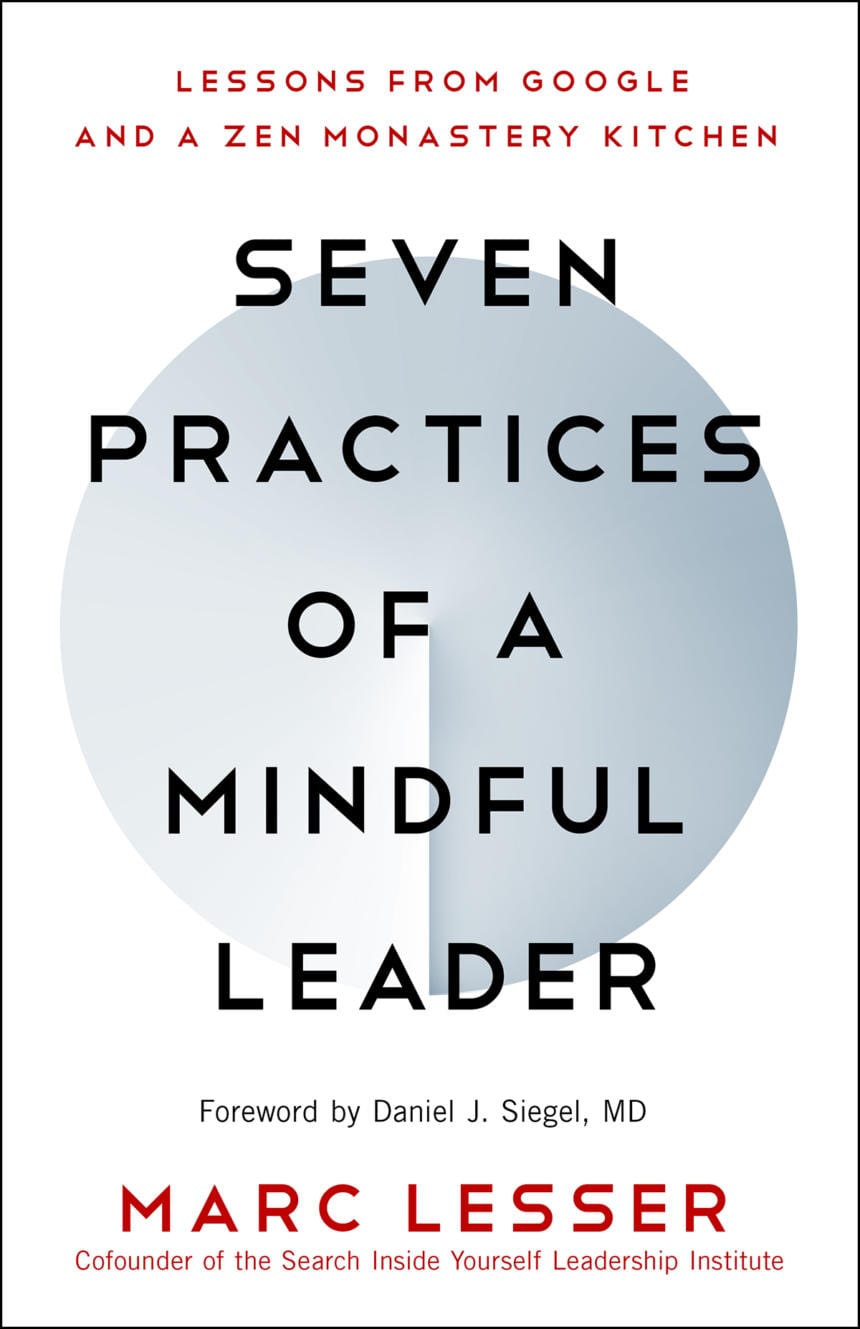Inspire, Aspire, and Conspire
From Seven Practices of a Mindful Leader: Lessons from Google and a Zen Monastery Kitchen
By Marc LesserIt is no accident that “love the work” is the first practice of a mindful leader. The work of mindfulness practice begins with love, with deep caring. Love is where body, mind, and heart come together. Love is more than an idea and more than a feeling.
“Love the work” is an instruction that is surprisingly practical; it can help us to overcome obstacles in many situations. What we love we pay attention to in ways that are palpably unique. Our task, our “work” in any given moment, may seem difficult or boring. It may involve many contradictions, hindrances, and setbacks. When we approach it with love, we see what’s important and embrace difficulties as part of the process, as necessities to be overcome. Love is the ultimate, most powerful motivator when taking action or relating to others, but it is a particularly powerful force when it comes to the practice of becoming more yourself, seeing with more clarity, and not being fooled by the illusions of deficiency or separateness.
There are many types of love. The kind I’m referring to here is much like the first step of the hero’s journey as described by Joseph Campbell, which he names “the calling.” The calling represents a profound shift of attention, a shift in one’s way of being in the world; the calling asks us to leave the ordinary and pursue the extraordinary. In Campbell’s words:
The call of adventure is to a forest, a kingdom underground, beneath the waves, or above the sky, a secret island, lofty mountaintop, or profound dream state; but it is always a place of strangely fluid and polymorphous beings, unimaginable torments, super human deeds, and impossible delight.
Answering the call leads to a heightened state of awareness and of purpose. The hero seeks something of ultimate importance, which means achieving “super human deeds” in the face of real danger (those polymorphous beings and unimaginable torments). In stories, the hero usually travels to a magical, dreamlike realm, but the calling really represents a transformation in the way you see your role, your purpose, your situation, and the stakes.
 Loving the work is this kind of calling. It asks us to approach leadership, our work, relationships, and all parts of our lives with the transformative motivation of love. This kind of love emerges from a deep place within and inspires us to risk and reach for what’s most important.
Loving the work is this kind of calling. It asks us to approach leadership, our work, relationships, and all parts of our lives with the transformative motivation of love. This kind of love emerges from a deep place within and inspires us to risk and reach for what’s most important.
The word inspire comes from the Latin inspirare, which means to breathe into. Love is something that is breathed into us and something that we bring our breath to. From inspiration comes aspiration, which also comes from the word breathe. Loving the work is aspirational — our aspirations, the things we yearn for and long for, are our ultimate goals, the aims of a lifetime. They form a deep intention, an enduring promise or vow, that continues to motivate us even when we complete certain tasks or fail at others. In Buddhist practice, there are two primary vows that express “the call,” or this type of inspiration and aspiration:
Beings are numberless. I vow to save them.
Delusions are inexhaustible. I vow to end them.
These two statements, these vows, are inherently contradictory and impossible. The calling of love doesn’t care. In fact, love is drawn to work that is difficult, even seemingly impossible. Love welcomes a challenging path, a path that seems impossible. After all, in many ways, we are impossible beings.
I often describe the work of meditation and mindfulness as a conspiracy, a word that literally means “breathing together.” Meditation might sound like a solitary activity, but it is not, just like answering the call of mindful leadership isn’t a solitary pursuit. That is, our aspirations and inspirations rely heavily on conspiring — so that we are all breathing together. So that we all conspire to support one another to become more ourselves and to help heal one another and the world. To me, this type of conspiracy embodies the culture that Peter Drucker suggests is all-important.
Exploring Values: What Do You Love?
Ask yourself:
- What inspires you?
- What really brings you alive?
- What do you aspire to?
- What is most important to you?
- What do you most love?
In The Leadership Challenge, a classic, bestselling leadership manual first published in 1987, authors James Kouzes and Barry Posner interviewed US Army Major General John H. Stanford, a highly decorated military leader who became the superintendent of the Seattle public school system. The authors asked Stanford for his advice about developing leaders, whether in the world of business, nonprofits, government, or academics. Stanford responded:
The secret to success is to stay in love. Staying in love gives you the fire to ignite other people, to see inside other people, to have a greater desire to get things done….I don’t know any other fire, any other thing in life that is more exhilarating and is more positive than love is.
Then, to emphasize their point, Kouzes and Posner end their book by stating: “Leadership is not an affair of the head. Leadership is an affair of the heart.”
I could not agree more, which is why “love the work” is the first practice of mindful leadership.
Try this: I helped develop this exercise within the Search Inside Yourself training as a way to help participants explore their values, what matters to them most, and what they love the most.
In a journal or on a sheet of paper, write down the names of three people whom you most admire. They can be alive or no longer living, from your personal connections or from history. They can be fictional movie characters or even cartoon heroes. Who comes to mind? Let yourself be surprised.
Then write a sentence or two as to why you chose these three people. What have they done and what do they represent to you? Think of situations that exemplify what led you to choose them. (I suggest doing this first before reading further.)
Usually the people we choose, those we most admire, represent what is most important to us. Does that fit for you? From your descriptions of these three people, write down what you consider your top three to five values. As you reflect on what you value, other ideas may arise that aren’t captured by the people you chose. You can add those as well.
Once you have your list of values, experiment with writing whatever comes to mind based on one or more of these prompts:
- What is most important to me is…
- My values are…
- The ways my values show up in my work and life right now are…
- The ways my work and life and values are not in alignment are…
- Actions I might take to narrow the gap between my values and activities include…
What Is Love?
Love is certainly a “calling” of leadership, but it’s also helpful to define love as a way to reflect on what this practice is really asking us to do.
While there are many kinds and definitions of love, I’d like to focus on four qualities or practices that make up love. In Buddhism, these teachings are known as the four immeasurables, since it is said that, as you practice them, each of these elements and the four together will continue to grow beyond what can be measured. These four qualities are:
- Lovingkindness
- Compassion
- Joy
- Equanimity
Lovingkindness: This is the practice of caring about others. I remember many years ago when I was CEO of Brush Dance, I was interviewed for a magazine article on the topic of integrating business and Zen. The reporter asked me, “What does it look like to practice Zen in the workplace?” My response was that the core practice is kindness—to care about and be kind to the people I work with, to our customers, to vendors, and even to be kind to myself. The reporter was clearly not satisfied, and he said, “No, really, what does it mean to practice Zen in the workplace?” I repeated my answer, saying that kindness is more difficult than it seems, especially when things go wrong, when there are conflicts, when cash flow is challenging. Kindness goes a long way at work.
Compassion: Compassion has three parts: feeling another’s pain, understanding others, and desiring to help others. Compassion, and leading with compassion, is a core part of mindful leadership. Compassion is a core thread that runs throughout these seven mindfulness practices.
Joy: This refers to a deep sense of happiness that is not dependent on conditions. It is the joy of appreciating being alive. This isn’t the Small Mind joy of doing well at work and getting a bonus; this is the Big Mind joy that appreciates and celebrates everything, good and bad. This particular practice of joy is also sometimes translated as sympathetic joy, or the practice of feeling joy by acknowledging, feeling, and celebrating the happiness of others.
Equanimity: This is the practice of letting go of self-concern, of cultivating acceptance and composure. Equanimity doesn’t mean suppressing or tamping down feelings. It is the practice of finding composure right in the midst of stress, confusion, change, challenges, and urgency.
In one of the early teachings of the Buddha, he names a variety of benefits that come from cultivating these practices of love. These benefits include
- Sleeping well
- Lightness in the heart upon waking
- Being well liked by others
- Being able to concentrate easily
- A brighter and clearer face
- At the time of death, the mind will be clear
These are pretty great benefits! I would add that, if you practice “love the work” in these ways on a regular basis, you are more likely to be happier and the people around you will be happier. Your work will be more effective and more successful. And you will influence the culture around you to be more engaging, creative, and lighthearted.
To learn more about the Seven Practices of a Mindful Leader, join Marc Lesser on March 22-24 at the Garrison Institute for a weekend retreat on Zen and Leadership. Click here for more information and to register.
Marc Lesser is a CEO, Zen teacher, author, and leads trainings and talks worldwide. He has led mindfulness and emotional intelligence programs at many of the world’s leading businesses and organizations including Google, SAP, Genentech, and Kaiser. He is currently CEO of ZBA Associates, a company providing mindfulness-based leadership trainings and creating community by supporting ongoing groups.
Previously, he served as CEO and co-founder of the Search Inside Yourself Leadership Institute, whose core programs he helped develop within Google. Marc was a resident of the San Francisco Zen Center for 10 years and former director of Tassajara, Zen Mountain Center. He currently leads Mill Valley Zen, a weekly meditation group. Marc has an MBA degree from New York University and is the author of Less: Accomplishing More By Doing Less and Know Yourself, Forget Yourself. More information on his website here.
Excerpted from the book Seven Practices of a Mindful Leader. Copyright ©2019 by Marc Lesser.
Printed with permission from New World Library.
